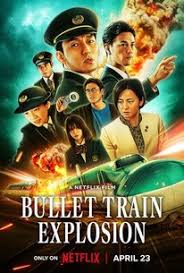
BULLET TRAIN EXPLOSION/ Shinkansen daibakuha
Japan, 2025, 134 minutes, Colour.
Tsuyoshi Kusanagi, Kanata Hosoda, Non, Hana Toyoshima
Directed by Shinji Higuchi.
In 1975, the earlier days of bullet trains, there was a thriller with that simple title, Bullet Train.
Now, 50 years later, with extensive experience of bullet trains not only in Japan but around the world, here is another thriller. While there is some focus on personal stories and characters, the main impact of the film is in its presentation of the bullet train itself, plenty of bombs, the situation of their exploding if the train went under 100 km an hour, the focus on the characters’ response, especially the guards and the driver, but the main focus and excitement of the film is the showing of the control centre, those involved, the tensions, decisions to be made, technology required.
The cinema audiences involved from the beginning with a group of children enthusing about the train and its being explained to them. And there are two sympathetic conductors, one loyal and in control, the other young and fearful. And there is a female driver, charged with the responsibility of not reducing the speed of the train. There are also a number of characters that the film focuses on, the disgraced politician, an influencer, full of himself, he decides to set up an online bank to raise the ransom money, and a disillusioned wounded man who is responsible for helicopter deaths.
However, there is a twist in the plot, quite unexpected, when the person claiming responsibility is the schoolgirl who has been behaving somewhat erratically, hiding, reserved. In the last hour, there is the revelation of her relationship with her abusive father, policeman, his role in an episode earlier, claiming to have killed the leader of a bomb planting group. Then it is revealed that she is in contact with the son of the leader who resents the girl’s father and his claim. He is interrogated, information about the situation of the bombs, and the moral situation where to stop the bombs, the girl says that they have to kill her because the connection is with her heart.
However, with frequent scenes of the train speeding through the Japanese countryside, several hours of journey, the focus is on the personnel in central control, the range of people involved, the technology, decisions to be made, political connections and interference, and some quite spectacular episodes, especially the running of a parallel train, making the link, getting tools across, the uncoupling of several carriages…
Film does build up its speeding tension with the closing of time, decisions to be made, practical efforts to be made to save the passengers.
- Straightforward title? The train, the history of the bullet train, in Japan, speeds, technology?
- The situation, passengers, the school children, the focus on the politician, the wounded man, the influence? Staff, the driver? Information about the bombs?
- The film’s focus on technology, 21st century, staff, management, skills, situations and decisions, the role of the government? The workers of the stations, the linking of the trains and the tools, the shifting of the rails? The final solution and divert the train, the crash? And the explosions?
- The atmosphere of the opening, the children, the school, the excitement of the travel? The teacher? The initial focus on Yuzuki? Different from the other students?
- The driver, her competence, demands, the high speeds, communications, with Takachai, with Fujii, the handling control? Orders, her fears, obeying orders, her hand freed from the control, the achievement?
- The guards, Takachai and his personality, loyalties, competence, interactions with the travellers, support of Fujii, communications, decisions, suggestions of going beyond Tokyo’s station, the crisis with Yuzuki, the issue of killing her, at her throat, his inability to kill her? The care of the group, of Fujii, cushions to soften the blow of the crash? The end, his achievement?
- The focus on particular passengers, the politician and her scandal, mentor, the influencer, self-importance, his decision to raise the money, the information on his phone? Fights, confrontations? The injured man, his past with the helicopter, sensitive guilt? His fighting with the group? Teacher, her concern for Yuzuki? Their being stranded on the carriage, the interactions, the issue of the killing of Yuzuki? Their inability to do it?
- The focus of the film on the control team, the leaders, their personalities, Japanese loyalties, the business, the experts, making decisions, parallel trains, the timing, the link, the toolboxes crossing, details of the uncoupling of the carriages? The exploding carriage? The issue of Tokyo’s station and devastation? To move the rails, the work begun, the political decision to stop? Issues of authority and jurisdictions? The final solution, the tension, the timing, moving the rails, separating the carriages, the crushing of the carriage, the final explosions?
- The revelation about Yuzuki, her contact with her father, the past story, his arrogance, the false reputation, the death of the bomber, the resentment of the bomber’s son, collaborating with Yuzuki, and her resentment towards her brutal father? The phone call, the interactions, pressing the bomb link and the house exploding?
- The passengers, the reaction to the news about Yuzuki, her health, the explosives connected with her heart, killing her and stopping the explosions? The discussions, their unwillingness?
- The interview with her collaborator, motivations, revenge, the setting up of the bombs? The arrest of Yuzuki, her being taken away?
- The excitement of the film, the relative importance of the personal stories compared with the tensions in the passengers and the runaway train, the authorities and technology?